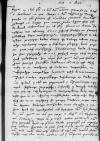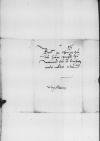Ea, quae accepi a domino Stanisław Kostka (*1487 – †1555), as a leader of the so-called nobles' party active in Royal Prussia since 1536, Kostka stood in opposition to most of the members of the Council of Royal Prussia, who wanted to maintain the autonomy of the province and a "balance of power" in terms of governance. The tension between the Prussian Subtreasurer and the Council had been increasing since the Diet in Graudenz (Grudziądz) in 1533. Kostka, connected with the royal court since his youth, was sent to Graudenz as the King's deputy and, contrary to custom, decided to take part in the proceedings. In response to such a step, the Council members stopped the meeting. Kostka accused them of hostility towards the Poles and intervened on this matter at the court. In the absence of the then Bishop of Ermland (Mauritius Ferber) it was Dantiscus who chaired the Graudenz Diet. The incident badly harmed his future relationships with Kostka; 1531-1555 Treasurer of the Prussian lands and Treasurer of Marienburg (Malbork); 1544-1545 Castellan of Elbing (Elbląg), 1545-1546 Castellan of Kulm (Chełmno); 1546-1549 Vice-Voivode of Kulm; 1546-1551 Voivode of Pomerania; 1551-1555 Voivode of Kulm (PSB 14, p. 356; Urzędnicy 5/2, p. 216; MAŁŁEK 1976, p. 119-123)⌊thesaurario terrarum PrussiaeStanisław Kostka (*1487 – †1555), as a leader of the so-called nobles' party active in Royal Prussia since 1536, Kostka stood in opposition to most of the members of the Council of Royal Prussia, who wanted to maintain the autonomy of the province and a "balance of power" in terms of governance. The tension between the Prussian Subtreasurer and the Council had been increasing since the Diet in Graudenz (Grudziądz) in 1533. Kostka, connected with the royal court since his youth, was sent to Graudenz as the King's deputy and, contrary to custom, decided to take part in the proceedings. In response to such a step, the Council members stopped the meeting. Kostka accused them of hostility towards the Poles and intervened on this matter at the court. In the absence of the then Bishop of Ermland (Mauritius Ferber) it was Dantiscus who chaired the Graudenz Diet. The incident badly harmed his future relationships with Kostka; 1531-1555 Treasurer of the Prussian lands and Treasurer of Marienburg (Malbork); 1544-1545 Castellan of Elbing (Elbląg), 1545-1546 Castellan of Kulm (Chełmno); 1546-1549 Vice-Voivode of Kulm; 1546-1551 Voivode of Pomerania; 1551-1555 Voivode of Kulm (PSB 14, p. 356; Urzędnicy 5/2, p. 216; MAŁŁEK 1976, p. 119-123)⌋, et quo modo solutus est conventus Cracoviensis, brevibus perstringo et lingua, qua accepi, scribo.
Sjem się jest dokonał. Uchwalono po 18 gr(oszy) z łanu na obronę. Ziemstwo ma chować 6000 jeznych szlachty na grańcach podolskich dla wtargnienia nieprzyjacielskiego, a w każdym powiecie będą obrany ci, ktorzy takowe pieniądze wy{e}bierać mają i służebnym płacić. Sigismund I Jagiellon (Zygmunt I) (*1467 – †1548), King of Poland and Grand Duke of Lithuania (1506-1548); Duke of Głogów (Glogau) (1499-1506), Duke of Opava (1501-1506), Governor of Silesia (1504-1506); son of King Kazimierz IV Jagiellon and Elisabeth of Austria⌊Krol jego m(iłość)Sigismund I Jagiellon (Zygmunt I) (*1467 – †1548), King of Poland and Grand Duke of Lithuania (1506-1548); Duke of Głogów (Glogau) (1499-1506), Duke of Opava (1501-1506), Governor of Silesia (1504-1506); son of King Kazimierz IV Jagiellon and Elisabeth of Austria⌋, pan nasz miłościwy, z duchownemi będą chować za swe pieniądze 4000 pieszych tamże też na grańcach podolskich.
Hoc numquam fuit, Reverendissime Domine, quod spirituales propriis peccuniis servassent stipendiarios etc.
To jest też ms. radcz reg. racz⌈radczms. radcz reg. racz⌉, W(asza) M(iłość), wiedzieć, iż Isabella Jagiellon (*1519 – †1559), 1539-1559 Queen of Hungary; from 1539 wife of John Zápolya, King of Hungary, mother of John II Sigismund Zápolya; daughter of Sigismund Jagiellon, King of Poland, and Bona Sforza⌊krolewa węgierskaIsabella Jagiellon (*1519 – †1559), 1539-1559 Queen of Hungary; from 1539 wife of John Zápolya, King of Hungary, mother of John II Sigismund Zápolya; daughter of Sigismund Jagiellon, King of Poland, and Bona Sforza⌋ w Visegrád (Plintenburg), town 40 km north of Budapest, on the right bank of the Danube, with an upper and lower castle and a royal palace⌊Wi superinscribed⌈ii superinscribed⌉szogrodzyeVisegrád (Plintenburg), town 40 km north of Budapest, on the right bank of the Danube, with an upper and lower castle and a royal palace⌋ w niedlyą Inuocauit jest koronowana. Poseł krola rzymskiego w Szobinowye na drodze Isabella Jagiellon (*1519 – †1559), 1539-1559 Queen of Hungary; from 1539 wife of John Zápolya, King of Hungary, mother of John II Sigismund Zápolya; daughter of Sigismund Jagiellon, King of Poland, and Bona Sforza⌊yey m(ylosczy)Isabella Jagiellon (*1519 – †1559), 1539-1559 Queen of Hungary; from 1539 wife of John Zápolya, King of Hungary, mother of John II Sigismund Zápolya; daughter of Sigismund Jagiellon, King of Poland, and Bona Sforza⌋ czekal y tham yą przywytal a co(n)gratulaciyą uczynyel. Poszlowye papyeszky, cesarski y veneczki w Budzynyw yey m(ylosczy) oczekywayą a znamyenythemy dary. Tho yesth, czom W(assey) M(ylosczy) udzyelicz umyszlil.
Scribit ulterius mihi:
Racz thesz tho, W(assa) M(yloscz), wyedzyecz, sse panyey brathowa W(assey) M(ylosczy) myala szyna, kthorego malszonka moya chrczila y ya szam, bych byl nye odyechal, rad bych ssyą tha(m) byl stawyl.
Ea sunt, Reverendissime mi Domine, quae accepi a magnifico domino Stanisław Kostka (*1487 – †1555), as a leader of the so-called nobles' party active in Royal Prussia since 1536, Kostka stood in opposition to most of the members of the Council of Royal Prussia, who wanted to maintain the autonomy of the province and a "balance of power" in terms of governance. The tension between the Prussian Subtreasurer and the Council had been increasing since the Diet in Graudenz (Grudziądz) in 1533. Kostka, connected with the royal court since his youth, was sent to Graudenz as the King's deputy and, contrary to custom, decided to take part in the proceedings. In response to such a step, the Council members stopped the meeting. Kostka accused them of hostility towards the Poles and intervened on this matter at the court. In the absence of the then Bishop of Ermland (Mauritius Ferber) it was Dantiscus who chaired the Graudenz Diet. The incident badly harmed his future relationships with Kostka; 1531-1555 Treasurer of the Prussian lands and Treasurer of Marienburg (Malbork); 1544-1545 Castellan of Elbing (Elbląg), 1545-1546 Castellan of Kulm (Chełmno); 1546-1549 Vice-Voivode of Kulm; 1546-1551 Voivode of Pomerania; 1551-1555 Voivode of Kulm (PSB 14, p. 356; Urzędnicy 5/2, p. 216; MAŁŁEK 1976, p. 119-123)⌊thesaurario terrarumStanisław Kostka (*1487 – †1555), as a leader of the so-called nobles' party active in Royal Prussia since 1536, Kostka stood in opposition to most of the members of the Council of Royal Prussia, who wanted to maintain the autonomy of the province and a "balance of power" in terms of governance. The tension between the Prussian Subtreasurer and the Council had been increasing since the Diet in Graudenz (Grudziądz) in 1533. Kostka, connected with the royal court since his youth, was sent to Graudenz as the King's deputy and, contrary to custom, decided to take part in the proceedings. In response to such a step, the Council members stopped the meeting. Kostka accused them of hostility towards the Poles and intervened on this matter at the court. In the absence of the then Bishop of Ermland (Mauritius Ferber) it was Dantiscus who chaired the Graudenz Diet. The incident badly harmed his future relationships with Kostka; 1531-1555 Treasurer of the Prussian lands and Treasurer of Marienburg (Malbork); 1544-1545 Castellan of Elbing (Elbląg), 1545-1546 Castellan of Kulm (Chełmno); 1546-1549 Vice-Voivode of Kulm; 1546-1551 Voivode of Pomerania; 1551-1555 Voivode of Kulm (PSB 14, p. 356; Urzędnicy 5/2, p. 216; MAŁŁEK 1976, p. 119-123)⌋.
Rogo Reverendissimam Paternitatem Vestram. Habuit quondam venerabilis dominus Felix parvulum lacum, ex quo fluvio Bauda or Banda⌈BaudaBauda or Banda⌉ progressum, quem impensis suis mundare fecerat, et quia situs in solo Reverendissimae Paternitatis Vestrae, velit eundem lacum mihi conferre ad vitam. Quem laculum facerem impensis meis adhuc melius mundare, nam si non fuerit provisus et  BCz, 1597, p. 560 mundatus omni anno, deperibit. Si quid magni esset, non auderem hidden by binding⌈[rem]rem hidden by binding⌉ rogare, sed quod volo, exiguum est, et credo, quod Reverendissima Paternitas Vestra favebit mihi ex gratia.
BCz, 1597, p. 560 mundatus omni anno, deperibit. Si quid magni esset, non auderem hidden by binding⌈[rem]rem hidden by binding⌉ rogare, sed quod volo, exiguum est, et credo, quod Reverendissima Paternitas Vestra favebit mihi ex gratia.
Quam ego promereri studebo tamquam domino meo. Quem Christus Dominus velit diu sospitem et felicem conservare, Dominum Deum oro.
 BCz, 1597, p. 560 mundatus omni anno, deperibit. Si quid magni esset, non auderem hidden by binding⌈[rem]rem hidden by binding⌉ rogare, sed quod volo, exiguum est, et credo, quod Reverendissima Paternitas Vestra favebit mihi ex gratia.
BCz, 1597, p. 560 mundatus omni anno, deperibit. Si quid magni esset, non auderem hidden by binding⌈[rem]rem hidden by binding⌉ rogare, sed quod volo, exiguum est, et credo, quod Reverendissima Paternitas Vestra favebit mihi ex gratia.


